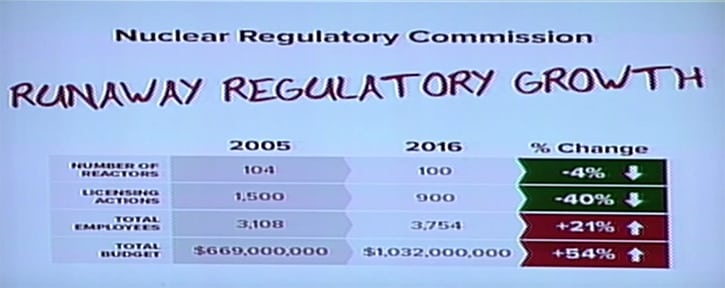Lawmakers Press for Smaller, More Efficient NRC
Some members of the U.S. House of Representatives feel the Nuclear Regulatory Commission (NRC) needs to appropriately align its budget and staffing levels with the organization’s workload.
That message was delivered to the agency’s commissioners during the Subcommittee on Energy and Power and the Subcommittee on Environment and the Economy joint oversight hearing held on Sept. 9.
Rep. Bill Flores (R-Texas) presented a slide (Figure 1) comparing the agency’s staffing and budget in 2005 to 2016 projections. He suggested that the total decrease in agency activity is “around 38% on a weighted-average basis, but the headcount has grown by 21% over that time period and the budget has grown by a whopping 54%.”
 |
1. Runaway regulatory growth? Although the number of reactors and licensing actions are down, NRC staffing and budget have increased. Source: Rep. Bill Flores |
“This squarely fits with what Reagan used to talk about when he talked about how the only thing that continues to—to have eternal life—to continue growing is a federal agency,” Flores said.
Flores wasn’t the only one suggesting change was needed. Rep. Bill Johnson (R-Ohio) seemed to suggest that retirements and resignations could get staffing to target levels in fiscal year 2016 when he noted that the NRC’s annual attrition rate between 2004 and 2012 was 5.4%. Johnson said the percentage equated to nearly 200 employees leaving the organization each year and that the NRC target of 3,600 people was a reduction of less than 100 from the agency’s current levels.
NRC Chairman Stephen Burns replied, “With respect to attrition, attrition is not always where you necessarily want it to be.” Burns noted that key oversight positions must be replaced. He said that the NRC was looking at “early outs and buy-outs” as an option.
“As a fee-based agency, your commission is statutorily required to recover 90% of your budget through the annual collection of fees from licensees,” said Rep. Adam Kinzinger (R-Ill.). “And referring back to the value of efficiency as one of the NRC’s principles of good regulation, it’s pretty obvious that the need for an established, credible process for developing a budget based on workload projections is necessary to determine a responsible fee assessment.”
Commissioner William Ostendorff agreed that there are some budget process areas that need improvement. He noted that a new chief financial officer was brought into the agency to make changes. When questioned by Kinzinger if the budget process would be “good” by 2017, Burns replied, “I think we will be. I’m confident.”
—Aaron Larson, associate editor (@AaronL_Power, @POWERmagazine)